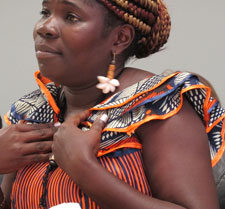Mae Azango was not surprised when the Liberian police failed to help when she began receiving threats of violence in response to an article she had written about female genital cutting that was published on in FrontPage Africa on March 8. She had previously reported critically on the police, including a case of police brutality against the mother of a rape victim. “I was doing hot stories on them so they were not happy with me,” Azango proudly states.
Azango came to the CPJ offices in New York this week to share her experience as a female journalist reporting on a subject that many from her society consider taboo. Being a local journalist addressing the topic compounded the backlash, she said, because other Liberians expect she “should have known better.” Had a foreign journalist reported on the same topic, they would have been dismissed, she said.
Asked why she chose to report on female genital cutting, Azango said, “A lot of people don’t have a voice. If I don’t write about it, how will people know about it?” Enraged by the fact that some children as young as three years old are sent to the traditional communities where female circumcision is practiced, Azango imagined how she would feel if her young daughter was forced to endure the traumatic, painful, and potentially dangerous experience. “I am a passionate person and I can transform my passion into something that will help others,” she said.
Azango said even her own tenant had threatened her for writing the story. “A tenant threatening the landlord?! Who has heard of that?” she demanded. When she went to authorities to complain, they did nothing and she was forced to go on living with that person. Incidents like that, as well as threats of violence from the Sande, a traditional Liberian community which continues to practice female circumcision, forced Azango to go into hiding. She compared the experience at first to feeling like a bat hanging in its cave.
When the international community, including CPJ, Amnesty International, Reporters Without Borders, Columbia University and others, heard about what was happening to Azango, they responded by mobilizing to demand her protection. Letters went out to the Liberian president and government officials, prompting the Ministry of Information to release a statement acknowledging the threats against Azango and guarantying her safety. Azango believes these were superficial gestures. “On the ground Mae Azango is her own security,” she says, “Self-preservation — [this] secured myself and my family.” The global pressure eventually led Liberian officials to publicly declare that they want to stop female genital mutilation for the first time.
Perhaps one of the biggest effects of the international effort to ensure her protection has been the local recognition Azango receives in her own country. “My name, Mae Azango, is already there before I get somewhere,” she told us. Azango feels empowered by the fact that local police and officials are worried by her intentions to continue to report on the health risks of female genital cutting. It means she must be doing something right and that her stories are having an impact.
Despite her current trip to the U.S., Azango has every intention of returning to Liberia and continuing her work. Before she left for America, the custom of cutting was still being practiced in Liberia. She said that before she left, she told the minister of information, Louis Brown, “Mr. Minister, I’m going to America but I’m coming back. That gives you two weeks to clean up your backyard.”
